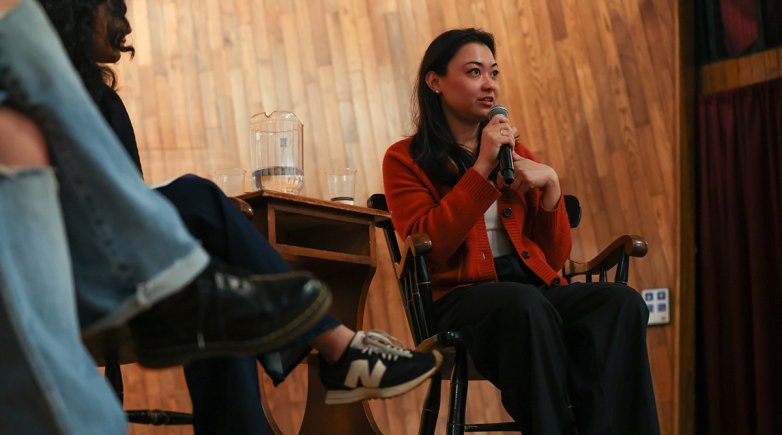Digging into data for a better Exeter
New institutional researcher helps to support and inform Academy's strategic priorities.
Director of Institutional Research Kari Hart has been at Exeter less than a year but she’s already making a difference. The primary designer, distributor and analyst of surveys related to student behavior, Hart is uncovering answers to such questions as how much sleep students are getting or how homework load varies by department and instructor. The answers help create a more complete picture of student experiences at Exeter. “My role is to design, manage and conduct research projects that are in-line with Exeter’s mission and its institutional priorities,” she says.
Institutional research (IR) is not new; it’s a data collection method used for years by colleges and universities to support admissions and accountability. Increasingly, private secondary schools like Exeter are using IR to help assess institutional priorities. Exeter has a data scientist who compiles statistics for admissions and alumni development purposes; Hart’s focus on student experiences, however, is unique. Assistant Principal Karen Lassey championed Hart’s position at Exeter, insisting that the IR director be part of the school’s decision-making process when designing new priorities and programs. “When we design an initiative, from the beginning we have to decide how we’re  going to measure its success and how we’ve met that objective,” says Lassey. “Kari is focused on students’ core experiences. She’s collecting and analyzing data and helping us decide whether we have clearly defined goals aligned with our strategic priorities. Many schools don’t have IR positions like that, so we’re really fortunate.”
going to measure its success and how we’ve met that objective,” says Lassey. “Kari is focused on students’ core experiences. She’s collecting and analyzing data and helping us decide whether we have clearly defined goals aligned with our strategic priorities. Many schools don’t have IR positions like that, so we’re really fortunate.”
Hart came to Exeter after 15 years in higher and secondary education, most recently as a teacher, dorm advisor and coach at The Peddie School in Hightstown, New Jersey. She has a doctorate in biostatistics, and taught statistics in a collegiate setting before delving into IR, which combined her passions for statistics and education. “My experiences in the secondary school world outside of research and analytics really inform my approach to my work,” she says. She’s especially committed to framing her research and analysis in ways that are inclusive and respectful of diversity and equity. “I’m excited about being at Exeter because I’m interested in working in a community that recognizes the importance of incorporating diversity of student identities and experiences in research,” Hart says.
Surveying the student experience
On Hart’s to-do list from her first weeks at Exeter was developing thoughtful, strategic ways of surveying students and collecting data. In fall 2022, Hart launched a survey, comprised of several pilot studies, to better understand how students use their time, and on a larger scale, how they interact with the school’s mission and values. In addition, she analyzed existing schedule data and worked with Exeter’s Center for Teaching Learning to issue a companion study on homework from a teacher perspective. The studies were administered last fall and included a shadow day experience: faculty and administrators followed 13 students throughout the course of their classes and afterwards. They took detailed notes and reflected on what they saw. Hart later presented results of the overall survey to students and faculty. “Behind some of the aggregate data from the survey, there are unique student experiences,” Hart says. “They have individual needs in terms of their time and spend it in different ways, so they need different supports.” Her work complimented the annual all-student survey, also administered in the fall.


